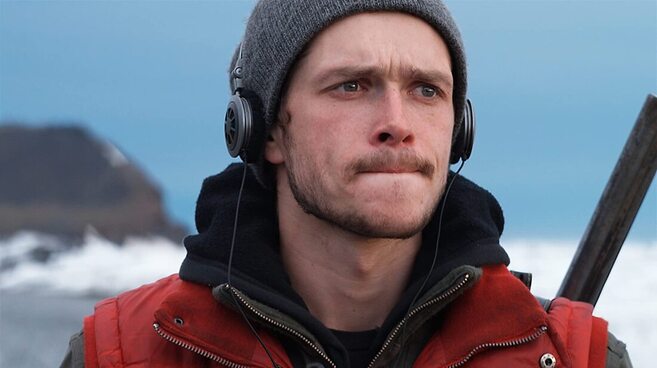HOW I ENDED THIS SUMMER
****
Director: Aleksey Popogrebskiy
Screenwriter: Aleksey Popogrebskiy
Principal cast:
Grigoriy Dobrygin
Sergey Puskepalis
Igor Chernevich
Artyom Tsukanov
Ilya Sobolev
Country: Russia
Classification: M
Runtime: 130 mins.
Australian release date: 7 April 2011
Alexei Popogrebskiy’s psychological thriller, How I Ended This Summer, is set in a majestic region of the Arctic Circle, in Chukotka, the north-easternmost tip of Russia. It is a compelling tale of the incompatibility of the two main characters, Pavel (Grigoriy Dobrygin) and Sergey (Sergey Puskepalis), who are caught up in a realm of slow time and vast space and how this isolation affects their psyches.
The two men are working at a meteorological station on a remote island over the summer months, a place of constant daylight. Sergey is older, a taciturn character who is constantly frustrated by Pavel’s youth, which he perceives as marked by recklessness and irresponsibility. Sergey is a bully but Pavel is lost in his own domain; he roams the area looking for things to distract him and spends much of his spare time with his headphones clamped to his ears or playing war games on his computer.
When a radio message comes through bearing tragic news for Sergey, he is away on an unauthorised fishing expedition. Pavel does not pass the message on out of fear and the consequent intimidation he is bound to suffer. Once he reveals the news to Sergey, it creates an unbelievably tense situation and the men spend a few days in a showdown that is gripping and full of surprises.
The performances are sensational, as is the Arctic backdrop beautifully shot by Pavel Kostomarov, who is an accomplished documentary director and worked with Popogrebskiy on Simple Things. He used a lot of wide-angle shots to convey the relationship of the men to the vast natural space they inhabited, which is literally at the end of the world.
Is this a metaphor for modern Russia? It was a country where people did as they were told in the past and appeared to have a devotion to duty, as seen in Sergey’s character. The film suggests that these characteristics are perhaps being replaced by a lack of ideals and direction, in the guise of Pavel, whose detachment from the outside world makes him more of a loose cannon.
How I Ended This Summer is a stunning film and one that stays with you long after you leave the cinema. It works on all levels and it is not surprising that it won the Silver Bear for both actors at the 2010 Berlin Film Festival, Best Film at the 2010 BFI London Film Festival and an Honourable Mention at last year’s Sydney Film Festival. Wrap up, take a flask of whiskey and be prepared to be gripped by this incredible survival story, knowing that at any moment a polar bear may leap out of nowhere.
Screenwriter: Aleksey Popogrebskiy
Principal cast:
Grigoriy Dobrygin
Sergey Puskepalis
Igor Chernevich
Artyom Tsukanov
Ilya Sobolev
Country: Russia
Classification: M
Runtime: 130 mins.
Australian release date: 7 April 2011
Alexei Popogrebskiy’s psychological thriller, How I Ended This Summer, is set in a majestic region of the Arctic Circle, in Chukotka, the north-easternmost tip of Russia. It is a compelling tale of the incompatibility of the two main characters, Pavel (Grigoriy Dobrygin) and Sergey (Sergey Puskepalis), who are caught up in a realm of slow time and vast space and how this isolation affects their psyches.
The two men are working at a meteorological station on a remote island over the summer months, a place of constant daylight. Sergey is older, a taciturn character who is constantly frustrated by Pavel’s youth, which he perceives as marked by recklessness and irresponsibility. Sergey is a bully but Pavel is lost in his own domain; he roams the area looking for things to distract him and spends much of his spare time with his headphones clamped to his ears or playing war games on his computer.
When a radio message comes through bearing tragic news for Sergey, he is away on an unauthorised fishing expedition. Pavel does not pass the message on out of fear and the consequent intimidation he is bound to suffer. Once he reveals the news to Sergey, it creates an unbelievably tense situation and the men spend a few days in a showdown that is gripping and full of surprises.
The performances are sensational, as is the Arctic backdrop beautifully shot by Pavel Kostomarov, who is an accomplished documentary director and worked with Popogrebskiy on Simple Things. He used a lot of wide-angle shots to convey the relationship of the men to the vast natural space they inhabited, which is literally at the end of the world.
Is this a metaphor for modern Russia? It was a country where people did as they were told in the past and appeared to have a devotion to duty, as seen in Sergey’s character. The film suggests that these characteristics are perhaps being replaced by a lack of ideals and direction, in the guise of Pavel, whose detachment from the outside world makes him more of a loose cannon.
How I Ended This Summer is a stunning film and one that stays with you long after you leave the cinema. It works on all levels and it is not surprising that it won the Silver Bear for both actors at the 2010 Berlin Film Festival, Best Film at the 2010 BFI London Film Festival and an Honourable Mention at last year’s Sydney Film Festival. Wrap up, take a flask of whiskey and be prepared to be gripped by this incredible survival story, knowing that at any moment a polar bear may leap out of nowhere.
